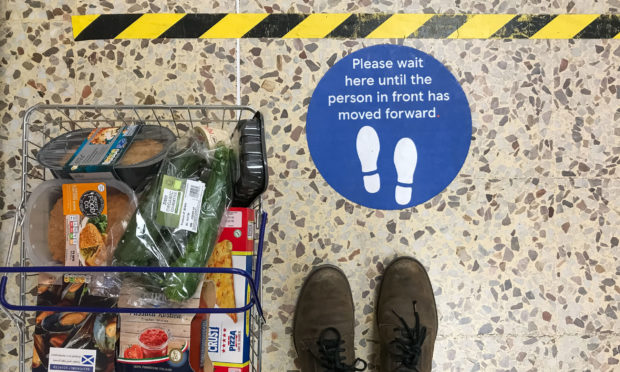I was in a long queue zig-zagging around a dark cavernous car park and as I edged forward an official told me: “You’re number 59.”
It seemed like I had drifted into one of my anxiety dreams again where I start searching for something and only end up farther away. Or that old cult TV series The Prisoner where lead character “Number Six” keeps screeching in despair, “I am not a number!”
Or maybe a police state – as we are now in danger of becoming, according to a former Supreme Court judge.
But it was none of these: I was content with being number 59 because it meant I was in the first tranche of customers allowed into a Tesco store early one morning.
It reminded me of airport security with barriers and channels corralling shoppers into a queue outside, but at least they seemed happy to welcome us – which doesn’t happen a lot when I go through airport security. The shop staff were a cheerful bunch doing a thankless and risky job, but were politely firm with customers over social-distancing.
The man on the door told me I was next in. He said the maximum number of customers allowed inside at any one time was now 70. Bingo, I was 59. I felt a sense of achievement by making the cut.
We shoppers seemed to accept this extraordinary situation quite calmly; it was another item in a basketful of lifestyle shocks we carry around with us.
Many of us had heads bowed staring at mobile phones. Mine read, “6° feels like 2°” in Aberdeen. I shivered as the queue stuttered along, but looked up as a kerfuffle broke out ahead. They were trying to take a trolley away from an old man in the queue.
He was having none of it: he clung onto it for dear life, as though he had been just thrown off the Titanic in a lifebelt. They shrugged their shoulders and let him have his way. We become very territorial at times of extreme panic, I suppose. But from a distance it seemed intrusive, so I asked one of the shop assistants what was going on.
It turned out that the old man picked a discarded trolley from somewhere else in the car park, but they were trying to persuade people to take them from near the door as they had been sanitised against coronavirus.
I watched as a lovely old couple next in the queue were split up – only one person per household was the rule.
As I exited later I saw two women who appeared to get away with queue jumping, so I denounced them like any good trainee informer. I approached the nearest member of staff, but for some reason I could not quite reach her. It dawned on me that she was going backwards in step with me going forwards. She put her hand up for me to stop – just in case I had the plague, I suppose.
“But I am 12 or 15 feet away,” I shouted in exasperation, so she would hear me.
That was more than the regulation two metres, but maybe she knew something which is just dawning on some scientists – that six feet might not be enough to prevent infection.
I registered my complaint, but she explained patiently that the two women were staff reporting for duty. They actually deserved a clap of hands, I thought.
I tip-toed away sheepishly after my disastrous attempt to become an informer; what you see isn’t always what you think you saw.
In communist East Germany the terrifying Stasi secret police were reputed to have nearly 500,000 informers who spied on fellow citizens. But buying wine or Easter eggs in our locked-down state must not resemble trying to outrun the Stasi at Checkpoint Charlie in Berlin.
I think the government was sloppy over its use of the phrases “essential shopping” or “basic necessities” in crisis advice. Surely it is the shopping journey itself which has to be essential when you are genuinely running low on supplies, for example, but not what you buy as it is so subjective. Once you are at the shop you can buy whatever they are selling, as long as you are not panic buying.
I’m glad Downing Street brought commonsense to bear by confirming that. I feared arrest for buying wine.
There was alarm over some police officers and minor public officials putting their own spin on a regulation by deciding what it ought to be rather than what it was. People might rage, others think they are isolated incidents – but they have to be challenged before they become endemic and routine.
Tougher lockdown rules make me nervous, but I can see the logic if people become complacent.
Back in the supermarket I was luxuriating in the space and comfort created by restricted numbers of fellow shoppers. This is one rule which can stay after we are back to normal, I thought. But I couldn’t buy any red wine because I was too early for licensing rules.
Do you think I would be able make a return journey just for wine? Should I ask a police officer?
David Knight is the long-serving former deputy editor of the Press and Journal











